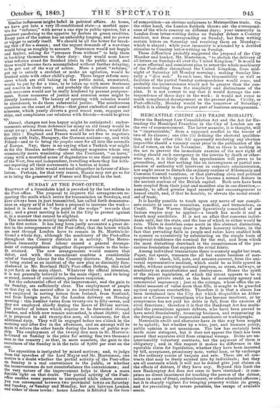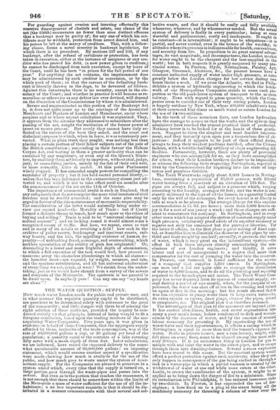MERCANTILE CREDIT AND TRADE MORALITY. BOTH the Bankrupt Law Consolidation
Act and the Act for Ex- tending the Municipal Franchise in the City of London are on the eve of commencement. The latter measure, it is thought, will be " impracticable," from a supposed conflict in the tenour of two of its clauses ; one (the 2d) defining the electoral qualifica- tion, and the other (the 3d) apparently rendering any election impossible should a vacancy occur prior to the publication of the list of voters, on the 1st November. But as there is nothing in the act to prevent the immediate exercise of the new right of voting should such emergency in the interim by death or other- wise arise, it is likely that the apprehension will prove to be groundless and that nothing like an interregnum or partial sus- pension of? authority will intervene in corporate administration, nor aught occur to disturb the ordinary routine of Aldermanic and Common Council vocations, or that pervading civic and political acquiescence which appears to have become a normal feature in the ancient nucleus of the British capital. Both acts have been here coupled from their joint and manifest aim in one direction,— namely, to afford greater legal security and encouragement to honest credit, and, if that be feasible, to elevate the moral stand- ard of trade.
It is hardly possible to touch upon any nerve of our compli- cate society at once so tremulous, ramified, and tremendous, as Credit. What Warren Hastings figuratively remarked of our Indian empire may be applied—a breath has made it and a breath may annihilate. It is not an affair that concerns indivi- duals only, but the state, and the loss of which to either would be ruin. There is doubtless some merit in this abstract distinction, from which the age may draw a future honorary tribute, in the fact that pervading faith in people and rulers have enabled both to operate so extensively by substituting on the simple basis of reciprocal confidence the nominal for the real, and from which the most disturbing drawback is the consciousness of the pre- carious foundation that supports the aerial fabric.
Among individual transactions there is scarcely aught but trust. Paper, not specie transacts the all but entire business of mer- cantile life : check, bill, note, and account-current, form the uni- versal representative medium, which could be as little spared in traffic, without arresting national progress, as steam, railways, or machinery in manufactories and conveyance. Hence the spirit of the recent legislation, of which the intent appears to be to strengthen private credit as the basis of monetary agency and commercial supremacy ; just as the coinage, whose office the ar- tificial measure of value more than fills, is sought to be guarded against spurious counterfeits. Therefore it is that a clause has been introduced into the City Act which disqualifies an Alder- man or a Common Councilman who has become insolvent, or by compromise has not paid his debts in full, from the exercise of civic functions; therefore it is that the Bankrupt Act has multi- plied the precautions against debtors, who have been proved to have acted fraudulently, resuming business, and reappearing in the deceptions guise of respectable merchants or tradespeople.
Mercantile credit and character have in this way been sought to be upheld ; but whether by a wise, just, and humane policy, public opinion is not unanimous. The law has certainly been made more stringent, but it does not appear the limit has been passed that separates civil from criminal wrongs. Debts are un- questionably voluntary contracts, but the payment of them is obligatory ; and in this respect it makes no difference in the equitable claim for liquidation, whether they have been incurred by bill, acceptance, promissory note, verbal loan, or by exchange in the ordinary course of bargain and sale. These are all con- tracts that may be freely entered into by individuals; but they are all contracts which it will not be denied give just claims on the effects of debtors, if they have any. Beyond this limit the new Bankruptcy Act does not seem to have stretched : it com- prises no direct enactment for touching the person of the debtor, unless in cases of fraud, embezzlement, or other admitted offences ; You can correspond between two provincial towns on Saturday but it is sharply vigilant for bringing property within its grasp, and Sunday, or Sunday and Monday, but not between Loia4ksta4sand for preventing, by severe penalties, the escape of available and either of those towns : hence London is fettered in tVe ince I assets. For guarding against evasion and insuring effectually this coercive disgorgement of chattels and estate, one clause of the act (the 256th) enumerates no fewer than nine distinct offences that a bankrupt may be guilty of; for any one of which his cer- tificate may be withheld, protection from arrest denied him, and his person be left at the mercy of creditors. This, with a follow- ing clause, forms a novel severity in bankrupt legislation, for which there is no precedent. By sections 257 and 259, if any bankrupt, after the refusal of certificate or protection, has been taken in execution, either at the instance of assignees or any cre- ditor who has proved his debt, (a new power given to creditors,) he cannot be discharged from such execution, except by leave of the Court, until he has been "in prison for the full period of one year." For anything the act contains, the imprisonment dose may be administered by each creditor in succession, or by the whole pack of them ; so that the carcass of the defaulting bank- rupt is literally thrown to the dogs, to be devoured ad libitum. Against this catastrophe there is no security, except in the cle- mency of the Court ; and whether in practice it will become as re- morseless or otherwise as any debtor law ever devised, will depend on the discretion of the Commissioner by whom it is administered.
Severe and unprecedented as this portion of the Bankrupt Act is, it does not quite come up to the cravings of the Associated Merchants and Bankers of London and Manchester, under whose auspices and at whose urgent solicitation it was organized. They, it appears from the circular they addressed to subscribers after the passing of the act, sought the restitution of the former power of arrest on mesne process. But sorely they cannot have duly re- flected on the nature of the boon they asked, and the cruel and diabolical purposes to which, when in force, it was notoriously per- verted. What in plain truth they sought, was nothing less than placing a certain portion of their fellow subjects out of the pale of the British constitution ; suspending in their favour the Habeas Corpus Act, and vesting in them a greater authority than can be exercised by any magistrate, or even any of the Queen's Minis- ters, by enabling them arbitrarily to imprison, without trial, judge, jury, or committing justice, merely by the fiat of their own writ, or more correctly, lettre de cachet. At this point Parliament wisely stopped. It has conceded ample powers for compelling the surrender of property ; but it has held sacred personal liberty,— unless that has been infringed in the extraordinary clause just ad- verted to, and which is not to take effect until six months after the commencement of the act on the 11th of October.
The importance of commercial credit is such in England, that any safeguards that do not comprise the more vital interests of civil freedom may be readily conceded ; and the same plea may be urged in favour of the due maintenance of mercantile respectability. The consideration of the latter would naturally bring under re- view our second head—the Morality of Trade : but if Credit formed a delicate theme to touch, how much more so the ethics of buying and selling ? Trade is said to be "universal cheating by mutual consent"; and on looking round it would almost seem a recognized canon of traffic. But how, we repeat, enter so vast and in many of its details so revolting a field ? how seek in the archives of police courts, bankruptcy and insolvent courts, rail- way boards, and the like, the appalling evidence of human de- pravity—of unblushing fraud, cozenage, and overreaching, which reckless speculation or the avidity of gain has originated ? Or, descending to a lower and more frightful depth of abomination, to which a full execution of the task would lead, how present in -nauseous array the shameless plunderings to which all classes— the humbler most—are exposed, by weight, measure, and tale, and the spurious substitutions, and all but universal adulteration of everything we eat, drink, or wear ? We shrink from the under- taking, just as we would have shrunk from a survey of the sewers and cesspools of the Metropolis. The epidemic is too general to be dwelt upon. Is anybody pure ? Can any one Bay "my hands are clean " ?

























 Previous page
Previous page